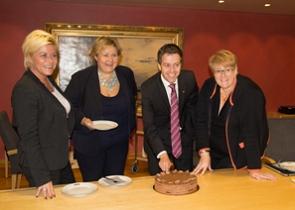UPDATED: After a friendly dinner at her residence Monday night, Prime Minister Erna Solberg gathered the leaders of the parties supporting her minority government coalition for important talks on Tuesday. She was also meeting with opposition leaders, to help build consensus on such thorny issues as the refugee crisis, in advance of state budget deliberations.

All four leaders of Solberg’s Conservatives, Finance Minister Siv Jensen’s Progress Party and their two support parties, the Christian Democrats and the Liberals, are keen to avoid a troublesome autumn. It’s much better to come to terms now on issues that can hold up approval of the state budget that must be presented in early October.
On Tuesday, they all returned to Nydalen, the central district in Oslo where they first hammered out their government cooperation after the national election in 2013. With a new election looming next year, it’s more important than ever for Solberg to keep her coalition together.
Topping their agenda in Nydalen on Tuesday are measures aimed at combating rising unemployment, restructuring Norway’s economy to make it less reliant on oil and gas and more in line with a so-called “green shift” towards environmental friendliness, and, most critically, how to deal with the ongoing refugee crisis facing Europe. While the numbers of asylum seekers arriving in Norway have slowed dramatically, with just 250 arriving last month compared to the 35,000 arriving last summer and fall, concerns are high they can pick up again after the winter. Just as Solberg and her colleagues were meeting came news of an internal report prepared by diplomats at Norway’s foreign ministry that gave an especially pessimistic overview of the situation and raised new border alarms.

Solberg’s government, now fronted by new Immigration and Integration Minister Sylvi Listhaug, has been under a torrent of criticism over how Listhaug intends to tighten immigration and asylum policy in practice. Her proposals, released right after Christmas, were meant to reflect a preliminary pact reached in Parliament last autumn, aimed at halting the stream of asylum seekers coming to Norway. Instead, it’s been bashed by both opposition leaders and the government’s own two support parties alike, as being far too tough and even violating UN policy. Trine Skei Grande, leader of the Liberal Party, declared last month that she was ready to withdraw support for the pact altogether, and Knut Arild Hareide of the Christian Democrats has been unhappy as well. Without their support, neither Solberg nor Listhaug can get their tougher policies through Parliament unless opposition party Labour, still Norway’s biggest, were to side with them.
Instead, the leaders of both the Christian Democrats and Labour expect that Listhaug’s “aggressive” measures will be toned down. It’s natural, they told newspaper Aftenposten on Tuesday, that Listhaug, Solberg and the rest of the government ministers listen to the feedback they’ve been getting and withdraw some of the most controversial proposals to preserve the parliamentary compromise. They include new proposed restrictions on how those winning asylum may be allowed to bring family members to Norway, how underage asylum seekers arriving alone in Norway can only receive protection and secure residence until they turn 18, and how some asylum seekers may only win temporary residence as well.
‘Constructive’
Solberg said after the meeting on Tuesday morning that her government had not reached any conclusions yet. “We have had a constructive meeting, where the primary intention was to listen to one another,” Solberg said. “I think we’ve had some good contributions and discussions, and we have a better idea of where we stand.” Listhaug also called it a “good meeting with a constructive tone,” but stressed that “we will put forward the stricter proposals we feel are necessary,” shortly after the Easter holidays.
Members of Parliament are expecting real progress on getting new asylum and immigration policy turned into concrete proposals for a new law. Labour leader Jonas Gahr Støre, who served as Norway’s foreign minister for more than six years, also wants a clear explanation of “Norway’s voice” in international gatherings about the refugee crisis in the Mediterranean, and how the government will follow up concerns about children living in asylum centers in Norway.

After meeting with other party leaders on the asylum issues Tuesday, Solberg, her government colleague Siv Jensen and support party leaders Hareide and Grande still needed to hash out tax reform proposals and not least a demand from the Liberals to raise fuel taxes yet again, to discourage driving. That’s not at all popular with Jensen’s Progress Party, which claims such taxes don’t have the desired effect. Norwegians, they argue, just pay them instead of curbing their driving.
Geir Lippestad, the City of Oslo’s new top politican in charge of settling and integrating refugees in the Norwegian capital, was most keen on resolution of the asylum policy debate. “As I see it, there’s been little action and a lot of noise to create headlines about asylum policy so far,” Lippestad told newspaper Dagsavisen on Tuesday. “The rhetoric has unfortunately been mostly characterized by fear and lack of knowledge, also some factual errors. That only leads to conflict and polarization, and that’s what we don’t need.”
newsinenglish.no/Nina Berglund

